Are you a vegetarian keto enthusiast looking to add some variety to your plate?
Well, you're in luck because we've got a smorgasbord of meat alternatives that will leave your taste buds dancing with joy.
Just imagine sinking your teeth into a juicy, plant-based protein that satisfies your cravings while keeping you on track with your dietary goals.
But that's not all – these alternatives are not only delicious, they also pack a punch of essential nutrients.
So, get ready to discover the top meat alternatives that will take your vegetarian keto journey to new heights.
Tofu

Tofu is a versatile plant-based protein that can be a valuable addition to your vegetarian keto diet. Not only is it low in carbs and high in protein, but it also offers several benefits that make it an excellent choice for those following a ketogenic lifestyle.
One of the benefits of tofu is its ability to promote satiety. Due to its high protein content, tofu can help you feel full and satisfied, which can be beneficial for weight management and sticking to your keto diet. Additionally, tofu is a great source of essential amino acids, which are necessary for muscle repair and growth.
Another advantage of incorporating tofu into your vegetarian keto diet is its versatility. There are countless tofu recipes available that can help you create delicious and satisfying meals while still staying within your macronutrient goals. Whether you're craving a tofu stir-fry, tofu scramble, or tofu curry, you're sure to find a recipe that fits your taste preferences.
Tempeh
If you're looking for a nutritious and versatile meat alternative on your vegetarian keto journey, tempeh is worth considering. Tempeh is packed with protein, fiber, and various nutrients that can support your overall health. It also contains beneficial probiotics that can promote a healthy gut.
When cooking tempeh, marinating it beforehand can enhance its flavor, and grilling or baking it can give it a delicious crispy texture.
Health Benefits of Tempeh
Tempeh offers numerous health benefits that can support your vegetarian keto journey. Here are three reasons why you should consider incorporating tempeh into your diet:
- Benefits of fermented foods:
Tempeh is a fermented food that undergoes a natural fermentation process. This process enhances the nutritional value of the food by increasing the bioavailability of nutrients and promoting the growth of beneficial bacteria in your gut. Consuming fermented foods like tempeh can improve digestion, boost immune function, and support overall gut health.
- Nutritional profile of tempeh:
Tempeh is a nutrient-dense food that provides essential vitamins, minerals, and plant-based protein. It's rich in fiber, which aids in digestion and helps regulate blood sugar levels. Additionally, tempeh is a good source of iron, calcium, and magnesium, which are important for maintaining healthy bones and muscles.
- Low in carbs and high in protein:
Tempeh is low in carbohydrates, making it suitable for a vegetarian keto diet. It's also high in protein, providing all the essential amino acids your body needs. Protein is essential for muscle growth and repair, as well as for maintaining a feeling of fullness and satiety.
Cooking and Preparation Tips for Tempeh
To make the most of tempeh's health benefits and incorporate it into your vegetarian keto diet, here are some cooking and preparation tips that will help you enjoy this versatile ingredient to the fullest.
Tempeh is a great addition to your meals as it's packed with protein, fiber, and essential nutrients. To prepare tempeh, start by slicing it into thin strips or cubes. This will help it absorb marinades and sauces better.
Next, steam or boil the tempeh for about 10 minutes to remove any bitterness. You can then marinate it in your favorite flavors, such as soy sauce, garlic, and ginger, before pan-frying or baking it until it turns golden brown and crispy.
Tempeh can be used in various dishes, including stir-fries, salads, and wraps. Experiment with different tempeh recipes to discover new and delicious ways to enjoy this nutritious ingredient.
Seitan
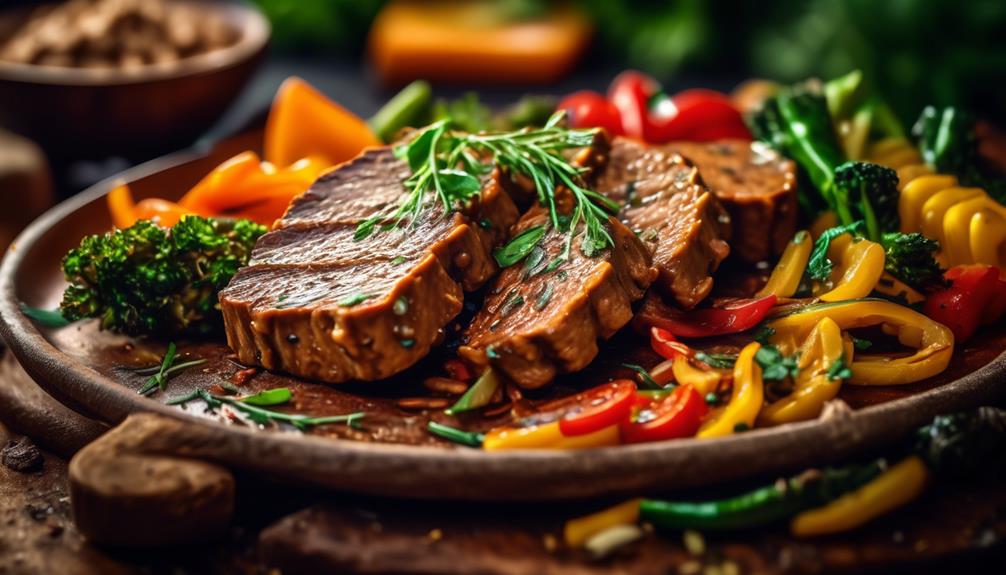
Seitan, also known as wheat meat, is a popular meat alternative for vegetarians on the keto diet. It's made from gluten, the protein found in wheat, and is low in carbs while being high in protein.
The health benefits of seitan include aiding in muscle growth, promoting satiety, and providing essential amino acids.
Health Benefits of Seitan
Seitan offers a range of health benefits that make it an excellent choice for vegetarians on the keto diet. Here are three reasons why you should consider incorporating seitan into your diet:
- High in protein: Seitan is made from wheat gluten, which is a complete protein source. It contains all the essential amino acids that your body needs for muscle repair and growth. With approximately 20 grams of protein per 100 grams, seitan can help you meet your protein requirements on a vegetarian keto diet.
- Low in carbs: Seitan is low in carbohydrates, making it a suitable option for those following the keto diet. It contains minimal amounts of sugars and starches, making it a great alternative to high-carb meat substitutes.
- Versatile and delicious: Seitan can be used in a variety of recipes, such as stir-fries, stews, and sandwiches. Its chewy texture and ability to absorb flavors make it a satisfying and tasty meat alternative.
Incorporating seitan into your vegetarian keto diet can provide you with the protein you need while keeping your carb intake low. Try experimenting with different seitan recipes to add variety to your meals.
Cooking With Seitan
If you're looking to explore the culinary possibilities of seitan, there are numerous ways to incorporate this versatile meat alternative into your vegetarian keto diet.
Seitan, made from wheat gluten, has a texture and taste that closely resembles meat, making it an ideal substitute in keto-friendly recipes.
When it comes to cooking techniques, seitan can be grilled, sautéed, baked, or even deep-fried for added crispiness.
You can marinate seitan in your favorite low-carb sauces or spices to enhance its flavor.
Recipe ideas for cooking with seitan include stir-fries, salads, tacos, and even vegan versions of classic dishes like buffalo wings or beef stew.
Remember to check the nutrition labels of store-bought seitan to ensure it fits within your keto macros.
Enjoy experimenting with seitan in your kitchen and diversify your vegetarian keto meals.
Edamame
Edamame is a nutritious and delicious option for vegetarians following a keto diet. Here are three reasons why you should consider adding edamame to your meal plan:
- Edamame is packed with protein: With approximately 17 grams of protein per cup, edamame is an excellent plant-based protein source. It provides all nine essential amino acids, making it a complete protein that can help support muscle growth and repair.
- Edamame is low in carbs and high in fiber: If you're following a keto diet, you'll be happy to know that edamame is low in net carbs. With only 8 grams of net carbs per cup, it can easily fit into your daily carb limit. Additionally, edamame is high in fiber, which aids in digestion and helps you feel full for longer.
- Edamame is rich in essential nutrients: Edamame is a good source of vitamins and minerals, including folate, vitamin K, iron, and magnesium. These nutrients play crucial roles in maintaining overall health and wellbeing.
To incorporate edamame into your keto diet, try adding it to salads, stir-fries, or even enjoy it as a snack on its own. With its nutritional profile and versatility, edamame can be a valuable addition to your vegetarian keto meal plan.
Lentils
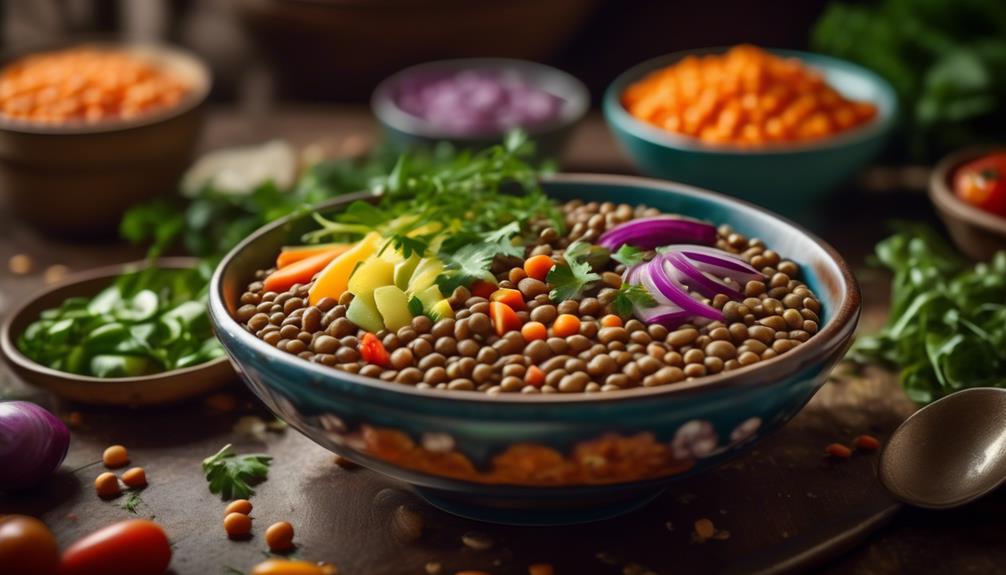
Are you looking for another versatile and nutritious option for your vegetarian keto diet? Consider incorporating lentils into your meal plan. Lentils are a type of legume that are packed with essential nutrients and can be used in a variety of delicious recipes.
Lentils are an excellent source of plant-based protein, making them a great meat alternative for vegetarians on a keto diet. Just one cup of cooked lentils contains about 18 grams of protein. They also provide a good amount of dietary fiber, with approximately 16 grams per cup. This high fiber content helps to keep you feeling full and satisfied, which can be beneficial when trying to maintain a healthy weight.
In addition to their protein and fiber content, lentils are also rich in vitamins and minerals. They're a good source of folate, iron, potassium, and magnesium. These nutrients play important roles in maintaining overall health and wellbeing.
When incorporating lentils into your vegetarian keto diet, there are plenty of delicious recipes to choose from. You can make lentil soups, salads, curries, or even use them as a base for vegetarian burgers. Get creative and experiment with different spices and flavors to create satisfying and nutritious meals.
Chickpeas
Chickpeas are a versatile and nutrient-packed legume that can be a valuable addition to your vegetarian keto diet. Here are three reasons why you should consider incorporating chickpeas into your meals:
- Nutritional benefits: Chickpeas are a rich source of protein, fiber, and essential minerals such as iron, magnesium, and potassium. They also contain antioxidants and phytochemicals that promote heart health and reduce inflammation.
- Cooking methods for chickpeas: There are several ways to prepare chickpeas to maximize their flavor and texture. You can roast them for a crunchy snack, blend them into a creamy hummus, or use them as a base for veggie burgers. You can also add them to soups, stews, or salads for a protein boost.
- Low in net carbs: Chickpeas are relatively low in net carbs, making them suitable for a vegetarian keto diet. They've a moderate glycemic index, which means they've a minimal impact on blood sugar levels. However, it's important to consume them in moderation to stay within your daily carb limit.
Incorporating chickpeas into your vegetarian keto diet can provide you with essential nutrients while adding variety to your meals. Experiment with different cooking methods to discover your favorite way to enjoy this nutritious legume.
Quinoa
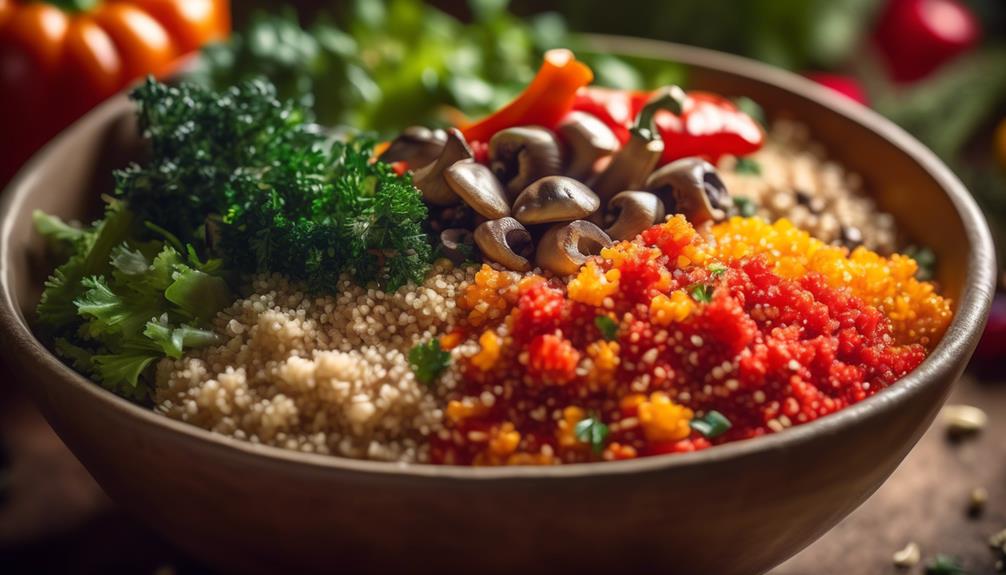
Quinoa is an excellent choice for vegetarian keto success due to its high protein content and low carb nature. With around 8 grams of protein per cup, it can help you meet your daily protein needs while keeping your carb intake in check.
Additionally, quinoa is a versatile cooking ingredient that can be used in a variety of dishes, making it a great addition to any vegetarian keto meal plan.
High Protein Content
With its impressive protein content, quinoa serves as an excellent meat alternative for vegetarian keto success. Here are three reasons why incorporating quinoa into your low carb diet can be beneficial:
- High Protein Content: Quinoa is a complete protein source, meaning it contains all nine essential amino acids that our bodies need. In fact, it boasts a higher protein content compared to most grains, making it a great choice for vegetarians looking to meet their protein needs.
- Low Carb Option: While quinoa does contain carbohydrates, it's considered a low carb option compared to other grains. This makes it a suitable choice for those following a keto diet, which emphasizes low carb intake to achieve ketosis.
- Nutrient-Dense: Quinoa isn't only high in protein but also packed with essential nutrients like fiber, magnesium, and iron. These nutrients support overall health and can help maintain energy levels while on a vegetarian keto diet.
Incorporating quinoa into your meals can provide you with a satisfying and nutrient-rich meat alternative that aligns with your vegetarian keto lifestyle.
Low Carb Option
Are you looking for a low carb option to incorporate into your vegetarian keto diet? Look no further than quinoa.
While quinoa is often considered a grain, it's actually a seed and is relatively low in carbs compared to other grains. With just 17 grams of net carbs per cooked cup, quinoa can be a great addition to your meal plan.
It's also packed with protein, providing all the essential amino acids your body needs. Quinoa is versatile and can be used as a base for salads, stir-fries, or even as a substitute for rice or pasta.
Versatile Cooking Ingredient
If you're looking to add a versatile cooking ingredient to your vegetarian keto diet, there's a nutritious option that fits the bill perfectly: quinoa. This ancient grain isn't only packed with protein, fiber, and essential nutrients, but it also lends itself to a variety of recipe ideas.
Here are three ways you can incorporate quinoa into your meals:
- Quinoa salad: Toss cooked quinoa with fresh vegetables, herbs, and a dressing of your choice. It's a refreshing and filling option for lunch or as a side dish.
- Quinoa stir-fry: Replace rice with quinoa in your favorite stir-fry recipe. The nutty flavor and fluffy texture of quinoa add a unique twist to this classic dish.
- Quinoa porridge: Start your day with a hearty and nutritious breakfast by cooking quinoa with almond milk, cinnamon, and your favorite toppings like berries or nuts. It's a delicious alternative to traditional oatmeal.
With its versatility and health benefits, quinoa is a fantastic addition to your vegetarian keto repertoire.
Hemp Hearts
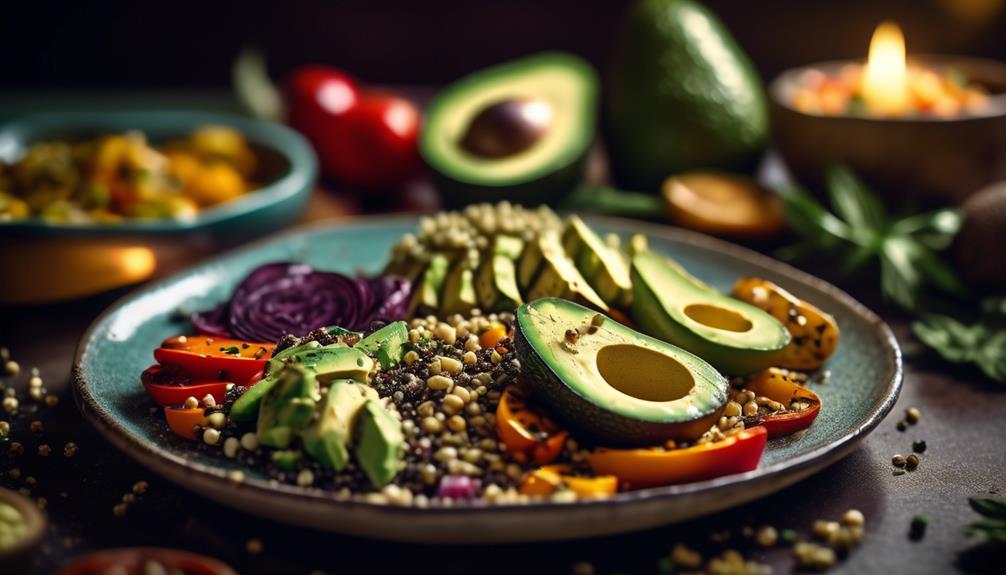
Hemp hearts offer a nutrient-dense and versatile option for incorporating plant-based protein into your vegetarian keto diet. Packed with essential amino acids, healthy fats, and fiber, hemp hearts provide numerous health benefits. They're rich in omega-3 and omega-6 fatty acids, which support heart health and reduce inflammation in the body. Additionally, hemp hearts are a great source of magnesium, iron, and zinc, which are essential for energy production and immune function.
One of the main benefits of hemp hearts is their high protein content. With approximately 10 grams of protein per ounce, they make an excellent addition to your vegetarian keto meals. You can sprinkle hemp hearts on salads, blend them into smoothies, or use them as a topping for roasted vegetables. They also work well in baking, adding a nutty flavor and a protein boost to your favorite recipes.
When it comes to incorporating hemp hearts into your vegetarian keto diet, the possibilities are endless. You can make hemp heart granola bars, protein-packed hemp heart pancakes, or even hemp heart energy balls. These recipes not only provide you with a delicious and satisfying meal but also ensure you meet your daily protein requirements.
Nuts and Seeds
Nuts and seeds provide a nutritious and versatile option for incorporating plant-based protein into your vegetarian keto diet. Not only are they packed with essential nutrients and healthy fats, but they also offer a wide range of cooking techniques to add variety to your meals.
Here are three key nutritional benefits of including nuts and seeds in your diet:
- Protein Powerhouses: Nuts and seeds are excellent sources of plant-based protein, making them an essential component of a vegetarian keto diet. Almonds, walnuts, chia seeds, and hemp seeds are particularly high in protein and can help meet your daily protein requirements.
- Healthy Fats: Nuts and seeds are rich in heart-healthy fats, such as monounsaturated and polyunsaturated fats. These fats can help reduce inflammation, support brain health, and improve cholesterol levels. Incorporating a variety of nuts and seeds, such as flaxseeds, pistachios, and pumpkin seeds, can provide a good balance of healthy fats.
- Nutrient Powerhouses: Nuts and seeds are also packed with essential vitamins, minerals, and antioxidants. For example, almonds are a great source of vitamin E, while flaxseeds are high in omega-3 fatty acids. Including a mix of nuts and seeds in your diet can help ensure you're getting a wide range of nutrients.
To maximize the nutritional benefits of nuts and seeds, try incorporating them into your meals in various ways. Add them to salads, sprinkle them over roasted vegetables, blend them into smoothies, or use them as a topping for keto-friendly desserts. Experiment with different flavors and textures to keep your vegetarian keto diet exciting and satisfying.
Plant-Based Protein Powders
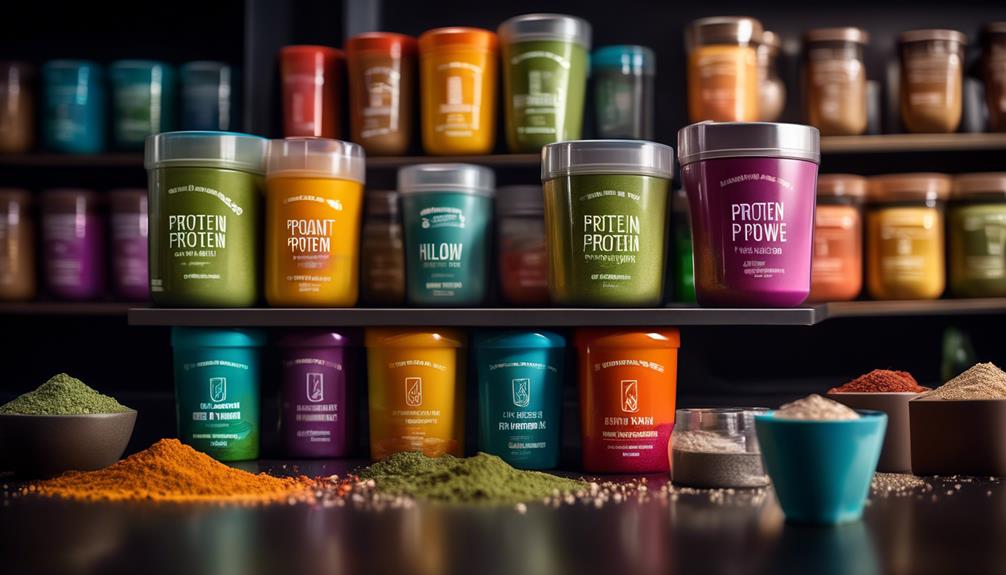
Plant-based protein powders are a convenient and effective way to supplement your vegetarian keto diet with an additional source of protein. These powders are made from various plant-based sources such as peas, brown rice, hemp, and soy. They're a popular choice among individuals following a vegetarian or vegan diet, as they provide a concentrated dose of protein without the need for animal products.
When choosing a plant-based protein powder, it's important to consider factors such as taste, texture, and nutritional profile. Some of the best brands for plant-based protein powders include Vega, Garden of Life, and Sunwarrior. These brands offer a wide range of flavors and formulations to suit different dietary preferences and goals.
Plant-based protein shakes can be easily incorporated into your daily routine. They can be enjoyed as a post-workout snack, a meal replacement, or a quick and convenient on-the-go option. Simply mix the powder with water, milk, or your favorite plant-based milk alternative, and shake well.
In addition to providing a good source of protein, plant-based protein powders also contain essential amino acids, vitamins, and minerals. They can help support muscle recovery, promote satiety, and aid in weight management. So, if you're looking to boost your protein intake on a vegetarian keto diet, plant-based protein powders are a great option to consider.
Conclusion
So there you have it, the top meat alternatives for vegetarian keto success.
Who needs a juicy steak when you can enjoy the versatile and protein-packed wonders of tofu, tempeh, and seitan?
And let's not forget about the humble lentils and quinoa, packed with nutrients and fiber.
Don't be afraid to sprinkle some hemp hearts, nuts, and seeds on top for that extra crunch.
And for those looking for a quick protein fix, plant-based protein powders have got you covered.
Who needs meat when you have such delicious and nutritious alternatives?







